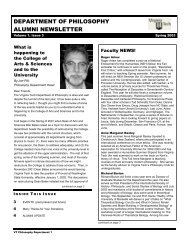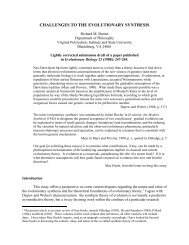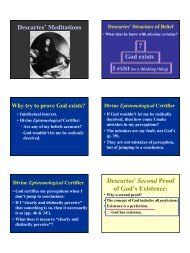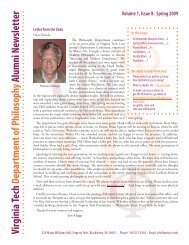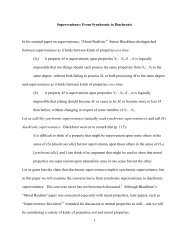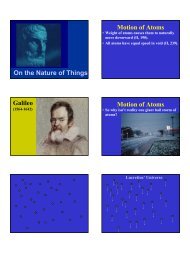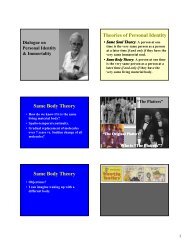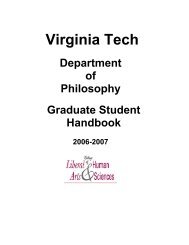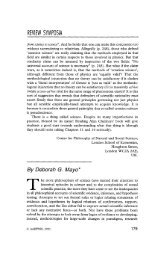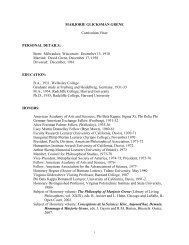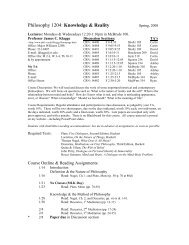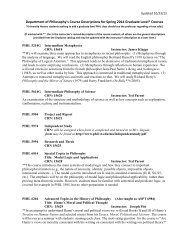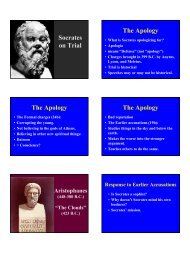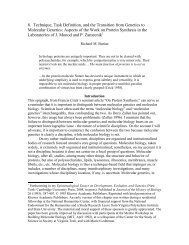Wittgenstein in Exile
Wittgenstein in Exile
Wittgenstein in Exile
You also want an ePaper? Increase the reach of your titles
YUMPU automatically turns print PDFs into web optimized ePapers that Google loves.
See<strong>in</strong>g <strong>Wittgenste<strong>in</strong></strong> as an <strong>Exile</strong><br />
<strong>Wittgenste<strong>in</strong></strong>’s extensive discussion of “see<strong>in</strong>g as” <strong>in</strong> Section XI of Part II of the<br />
Philosophical Investigations seems pert<strong>in</strong>ent to our discussion. In particular, we have been<br />
“notic<strong>in</strong>g an aspect” (p. 193/p. 165 <strong>in</strong> 3 rd edition) of <strong>Wittgenste<strong>in</strong></strong>’s life. How we see<br />
<strong>Wittgenste<strong>in</strong></strong>’s life depends <strong>in</strong> part on what surround<strong>in</strong>gs we choose to emphasize. I have tried to<br />
arrange pieces of his life <strong>in</strong> such a way that it is natural to see similarities to the Hebrew concept<br />
of an exile. I have been helped <strong>in</strong> this by Spenglerian ideas that <strong>Wittgenste<strong>in</strong></strong> took seriously.<br />
<strong>Wittgenste<strong>in</strong></strong> exhibits many of the characteristics of an exile: He lives outside his own culture<br />
<strong>in</strong>voluntarily; he is alienated from his surround<strong>in</strong>gs; and he feels himself to be a voice cry<strong>in</strong>g <strong>in</strong><br />
the wilderness, preach<strong>in</strong>g to the faithful remnant, <strong>in</strong>veigh<strong>in</strong>g aga<strong>in</strong>st the idols. Not only does he<br />
exhibit these characteristics, but he uses the term “exile” (as well as “exiliert” and “Verbannung”<br />
<strong>in</strong> German) <strong>in</strong> describ<strong>in</strong>g himself.<br />
Once we see <strong>Wittgenste<strong>in</strong></strong> as an exile, I th<strong>in</strong>k this enables us to better understand some<br />
th<strong>in</strong>gs about his life and thought. It provides a motivation for his <strong>in</strong>terest <strong>in</strong> liv<strong>in</strong>g <strong>in</strong> Russia—a<br />
possible homeland for him. I th<strong>in</strong>k it also helps us to better understand his conception of the<br />
philosopher and the role of philosophy. And, I th<strong>in</strong>k it helps us to better understand his<br />
ambivalence about religion <strong>in</strong> his own life. To these latter issues I now turn.<br />
<strong>Exile</strong> and the Philosopher<br />
As far as I can tell, <strong>Wittgenste<strong>in</strong></strong>’s own th<strong>in</strong>k<strong>in</strong>g about philosophy and philosophers is not<br />
<strong>in</strong> any way <strong>in</strong>fluenced by Spengler’s ideas about philosophy. Spengler sees philosophy as<br />
embody<strong>in</strong>g the ideology of an age, and <strong>in</strong> particular, a mechanistic philosophy will be<br />
characteristic of a civilization of the sort <strong>in</strong> which we now live. 26<br />
But the notion of an exile, as<br />
generated by Spengler’s conceptual-historical scheme, is useful for th<strong>in</strong>k<strong>in</strong>g about <strong>Wittgenste<strong>in</strong></strong>’s<br />
conception of the philosopher.<br />
7



